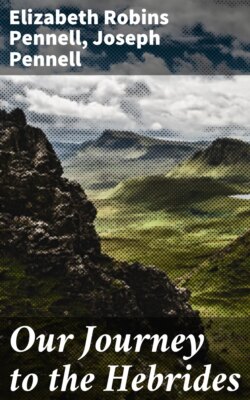Читать книгу Our Journey to the Hebrides - Joseph Pennell - Страница 7
На сайте Литреса книга снята с продажи.
GLASGOW
ОглавлениеTable of Contents
is unnecessary," and again we are willing to take his word for it. But its Cathedral was the first of the many surprises Scotland had in store for us. We had heard of it, but that was all. One young lady of Glasgow, fresh from a tour on the Continent, told us that she had never seen it. We were therefore prepared to find it no great thing. The exterior did not disappoint our expectations, but we have seldom been more impressed with an interior, and this though we had just come from the loveliest churches of England.
The crypt, or rather the under church, is its pride, as indeed it well may be. A verger stood smoking a pipe at the south door, and we told him what we thought. J——, after three years' work in the English cathedrals, felt himself no mean authority.
"It's the finest in the world," said the verger.
"In Great Britain perhaps, but not in Europe," said J——; for we had been but a moment before comparing it, as it now is, a cold, bare, show-place, to the under church of Assisi with the frescos on the walls, the old lamps burning before altars, the sweet smell of incense, and the monks kneeling in prayer.
"I only tell you what those qualified have said," and the verger settled the matter and J——'s pretensions.
It was in the Glasgow crypt Rob Roy gave the warning to Frank Osbaldistone. The guide-book recalled the incident, which we had forgotten. Indeed the farther we went, the more we were reminded that to travel in Scotland is to travel through the Waverley Novels, and that these to us were but a name. Since our return we have tried to read them again, to be quite honest, with but indifferent pleasure. We are so wanting in appreciation that we find Scott's description of the crypt stupid, and we are not thrilled by the daring deeds of the MacGregor.
The Art Gallery in Glasgow was no less a surprise to us than the Cathedral. Its catalogue contains more Titians, Rembrandts. Hobbemas, and other great masters than any other in Europe. But if we wondered at the catalogue, we were still more astonished when we came to see the pictures!
We stayed in Glasgow until Monday morning, when we again took the train, but this time for a few miles only. We bought tickets for Kilpatrick, and a sharp lookout we had to keep for it from the carriage windows. At the stations, no one called the names, which, in true British fashion, were less easy to find than that of the best brand of mustard or of the best hotel in Glasgow. At Kilpatrick, when I pulled my head in after the usual search, J—— was already at the opposite door. He did not care where he was, he said; he would get out. In the distance, we could see Dumbarton Rock rising from the plain against a blue sky. Here, as in our plans for the day's journey, it was the one prominent landmark.
Kilpatrick is said to have been the birthplace of St. Patrick. I do not know what authority Black[C] has for the legend; certainly not that of the villagers. St. Patrick was no British man, one of them told us; and, moreover, he never lived in Kilpatrick, but on the hill. But had we ever heard of Captain Shonstone, the hairbor-maister? He was a great man.
We made a great show of briskness by going the long way round by the canal. This was the only time throughout our journey that we turned from the main road—except to take a short-cut. Mr. Lee Meriwether, in his Tramp Abroad, thought it an advantage of walking that he could leave the road to see whatever was to be seen near, but not from it. For our part, after the first mile, we never took an extra step for any sight; that is, whenever our knapsacks were on our backs. At Dumbarton we did not even climb the rock, though Dr. Johnson walked to the very top. Instead, we lunched and talked politics with the British workman in a coffee tavern.
After Dumbarton, we left the Clyde to follow the Leven. It was just beyond the town we first saw Ben-Lomond, a blue shadow on the horizon when the clouds were heavy above; a high bare mountain, seamed and riven, when the sun shone upon it. We lost sight of it in a succession of long, stupid villages; on the shady road, where the trees met overhead, we could see it again through the net-work of branches. Clouds were low on its heights, and a veil of soft light rain fell before it when, having left our knapsacks in the inn at Balloch, we rowed up the Leven, a little quiet river between low woods and flat meadow-land, to
